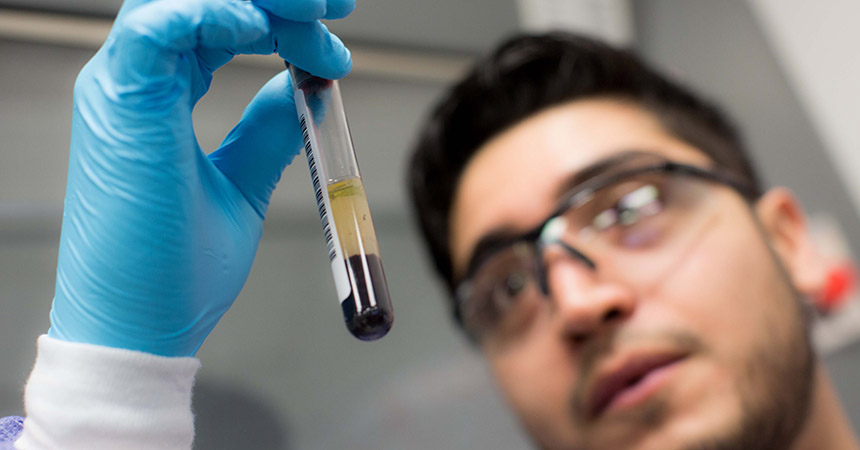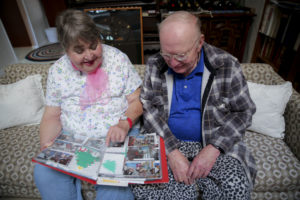Would you want to know?
By Jan Jarvis
Beverly Dittmer is the kind of high-spirited West Texas woman who never backs away from a fight.
Over 76 years, this plucky woman has faced a few, from breast cancer to her husband Paul’s diagnosis with Alzheimer’s disease. Now the mother of seven children and grandmother of 19 braced for what could be the fight of her life.
“If it turns out I have Alzheimer’s, I will fight it,” said Dittmer, who has recently experienced memory loss. “I’m going to go back to college and learn another foreign language. I’m going to work at staying active; I’m going to do whatever I can to keep my brain going.”
Among the first
With that attitude, it is no surprise that Dittmer is among the first people in North Texas to sign up for a study of the first blood test to detect Alzheimer’s disease. The study is now underway at UNT Health Science Center.
For more than a decade, Sid O’Bryant, PhD, Executive Director of the Institute for Translational Research at UNTHSC, has pushed tirelessly for a way to diagnose Alzheimer’s disease earlier. His efforts have paid off with a groundbreaking blood-test study funded by the National Institute on Aging. This $6.5 million study could be a game-changer for Alzheimer’s disease, which affects about 5.8 million Americans.
“It is the first study in history to look at a blood test for Alzheimer’s in the primary-care setting,” Dr. O’Bryant said. “This study is changing the future of health care.”
The test looks for biomarker proteins in the blood – a type of disease signature – to detect Alzheimer’s disease earlier. These biomarkers, which are unique to Alzheimer’s, have been shown to be 96 percent accurate.
For now, the only way Alzheimer’s can be definitively diagnosed is through autopsy, extensive PET scans or invasive lumbar punctures. For those who suspect their memory loss is linked to Alzheimer’s disease, getting a diagnosis means maneuvering through a medical maze of expensive, costly, time-consuming tests. At a time when they planned to enjoy retirement, those at risk face spinal fluid tests, PET scans, MRIs and more. It is a very stressful time for patients, said Jennifer Arnouville, DO, who specializes in geriatric medicine.
“It can take months for a patient to see a neurologist,” Dr. Arnouville said. “A quick screening test could be extremely meaningful.”
Reduce the cost
When used in a primary care setting, the blood test would not only reduce the cost of diagnostic procedures, but also makes it possible to treat patients earlier, Dr. O’Bryant said.
Although there is no cure for Alzheimer’s, the Food and Drug Administration has approved five drugs that treat memory loss, confusion and problems with reasoning.
Alzheimer’s is not a one-size-fits-all disease. There are different types of dementia, and some treatments are definitely not indicated for every type, Dr. O’Bryant said. Some drugs are used in the early stages while others are not prescribed until the disease has progressed.
“This blood test is a way of making sure the right patient gets the right therapy at the right time,” he said.
With the number of U.S. cases expected to more than double to 13.8 million by 2050, the urgency to discover drugs is intense. It has been nearly two decades since the FDA approved the last novel drug for Alzheimer’s.
Finding the right medication for the right stage of Alzheimer’s is essential. Without accurate testing, a patient could end up taking a drug that reduces their cognitive problems but does nothing to help them as the disease progresses.
“Many patients probably don’t even have Alzheimer’s, but they’re put on Alzheimer’s medications,” Dr. Arnouville said. “It’s not beneficial to their health or their finances.”
Through the study, patients benefit from cutting-edge diagnostic testing that is not easy to get quickly.
Individuals 65 and older who qualify for the assessment undergo diagnostic procedures that includes the blood test, memory testing, an MRI and a PET scan at no cost. A health care provider must refer patients.
Not a hard sell
Dr. Arnouville said she has referred numerous patients to the study.
“It has not been a hard sell,” she said. “Sure, sometimes patients are afraid of the answers, but it’s still better to know so they can start treatment.”
Even before the study started, Dittmer had already put her faith in Dr. O’Bryant. Hoping to learn more about the disease, she had gone to an Alzheimer’s conference where he was the speaker. Her husband Paul, a computer whiz who climbed the corporate ladders of IBM and Texas Instruments before starting his own consulting firm, had begun experiencing memory loss.
“At first I thought maybe he didn’t have it,” Dittmer said. “But then I could see he was starting to go down.”
Since then, she has seen what Alzheimer’s does to a family.
“It’s a horrible disease, and it just sneaks up on you,” she said. “It’s like the computer in your head doesn’t work right anymore.”
She has already started fighting back for herself by swimming, walking her dog and teaching water aerobics. Known for her perfect peach cobblers, she cooks, reads and writes books, including one to help children understand cancer.
Although Dittmer has tackled the possibility of having Alzheimer’s head-on, many people are not so bold.
Giving reassurance
They worry that they have Alzheimer’s whenever they lose their keys or forget someone’s name. For many, the blood test is a simple way to rule out the disease.
“The test can give patients reassurance so they can stop worrying,” Dr. Arnouville said. “It eases patients’ minds, but it also allows the physician to look at what else might be going on and address that quickly.”
Alzheimer’s affects about 20 percent of seniors, which means that for the vast majority of older adults, this test could reduce their fears, Dr. O’Bryant said.
When Dittmer heard about a test for Alzheimer’s, she was eager to sign up for her own well-being as well as future generations who could benefit from the research.
“Why would someone not want to know this?” she asked. “I figured why not throw my hat in the ring.”
Dittmer, like other study participants, had an MRI and PET scan to detect plaque in the brain that forms when proteins called beta-amyloid clump together. She also had blood and cognitive tests.
Those who participate can decide whether or not they want to know the results, which are ready in 8 to 12 weeks. Participants will have the choice of having memory testing and MRI results sent to them or they may choose to have them sent to their health care provider.
The amyloid PET scan result will only be sent to the health care provider if memory problems are identified and the participant has authorized it. Results of the blood test will not be made available to patients because it is considered experimental.
If the results indicate Alzheimer’s, patients can look at their treatment options and gain access to community resources much sooner to help them make decisions about their future.
Dittmer wanted to be prepared if her occasional memory loss turned out to be Alzheimer’s disease. The knowledge would allow her to make financial decisions, prepare her family and pursue her bucket list while there is still time.
Fortunately for Dittmer, the test results brought good news. She still is committed to staying active by caring for her husband, writing more books and teaching water aerobics classes.
“If the news had been bad, I’d be doing the same things,” she said. “I just would be less happy doing them.”
At a glance
The present
Today, the only way Alzheimer’s can be definitively diagnosed is through autopsy, extensive PET scans or invasive lumbar punctures. It’s expensive and time-consuming.
The possibility
A study is underway on a blood test that looks for certain biomarker proteins –which are unique to Alzheimer’s disease – to lead to an early diagnosis. These biomarkers have been shown to be 96 percent accurate.
The importance
Early diagnosis means patients no longer live with uncertainty and that treatment can be tailored to the individual.







Social media